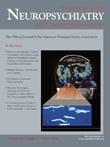To the Editor: Symptomatic West Nile virus infections present with fever, headache, and flu-like constitutional and gastrointestinal symptoms, and less commonly with neurological signs and symptoms. The hallmark features of neuroinvasive West Nile virus infections
1,
2 are meningitis, encephalitis, and/or poliomyelitis-like acute flaccid paralysis. In addition to these hallmark features, neuroinvasive West Nile virus infections may also entail other motor (e.g., tremor, parkinsonism, myoclonus, ataxia, etc.), cognitive, and neuropsychiatric impairments.
1 –
4 In the absence of the hallmark features of neuroinvasive West Nile virus, however, postinfectious neurobehavioral signs and symptoms are not expected. We describe here a patient with West Nile fever (i.e., without initially apparent neuroinvasive West Nile virus infection) who developed multiple persistent postinfectious neurobehavioral disturbances.
Case Report
A 54-year-old man with Crohn’s disease (on a regimen of azathioprine, 150 mg/day) presented with fever (104°F), nausea, and vomiting, but no acute neurological signs or symptoms. Serological testing confirmed acute West Nile virus infection. Approximately 3 weeks later, he developed bilateral upper extremity kinetic and rest tremors, impaired concentration and “memory,” and depressive and anxious symptoms. His motor, cognitive, and emotional symptoms persisted thereafter.
Neurological examination 2 years after West Nile virus infection demonstrated transient end-gaze nystagmus and saccadic pursuits; symmetrically increased bilateral upper extremity resistance to passive manipulation, bradykinesia, 4-Hz rest tremor with a postural component, kinetic and intention tremors, and dysdiadochokinesis; decreased vibratory sense in his feet; mild ataxia; and a narrow based gait with preserved tandem gait and no retropulsion. His Mini-Mental State Examination (MMSE) was normal but his Frontal Assessment Battery score was severely abnormal (Z-score=−4.5). His performance on the Repeatable Battery for the Assessment of Neuropsychological Status, Stroop Color and Word Test, Trail Making Test, the Controlled Oral Word Association Test (COWAT), and WAIS-III Digit Symbol subtest demonstrated impairments in attention, working memory, lexical fluency, and executive function. Depressive and anxious symptoms were evident on the SCL-90-R, and the Neuropsychiatric Inventory identified anxiety and apathy/indifference. His performance of basic and instrumental activities of daily living (using Functional Independence Measure, Functional Activities Questionnaire, and Disability Rating Scale assessments) was normal but the Medical Outcomes Study 36-item Short Form Survey Instrument identified significant impairments in multiple aspects of quality of life. Two family members corroborated the subacute postinfectious onset and subsequent static nature of the patient’s neurobehavioral signs and symptoms.
Comment
The neurobehavioral signs and symptoms experienced by this patient are typical of neuroinvasive West Nile virus.
2 –
4 However, the onset and persistence of parkinsonism, cerebellar signs, impairments in frontally mediated cognition, and emotional dysregulation following West Nile virus fever alone (i.e., without meningitis, encephalitis, and/or acute flaccid paralysis) is highly unusual and has not been reported previously.
The patient’s preinfection immunosuppression, the temporal relationship between this patient’s serologically confirmed West Nile virus infection and the onset of his movement disorder and neurobehavioral problems, and the static character of these problems over 2 years postinfection suggests initially subclinical neuroinvasive West Nile virus infection as the etiology of this patient’s neurobehavioral disorder. Involvement of subcortical, cerebellar, and brainstem structures, consistent with the predilection of West Nile virus for these areas,
5 is a unifying explanation for the constellation of postinfectious neurobehavioral signs and symptoms experienced by this patient. Additional studies are needed to determine whether similar neurobehavioral problems occur after West Nile virus fever more often than is recognized presently.
Acknowledgments
This report was supported by funding from the Centers for Disease Control and Prevention (R01 CI000224) and the National Institute of Neurological Disorders and Stroke (K23 NS052487).

